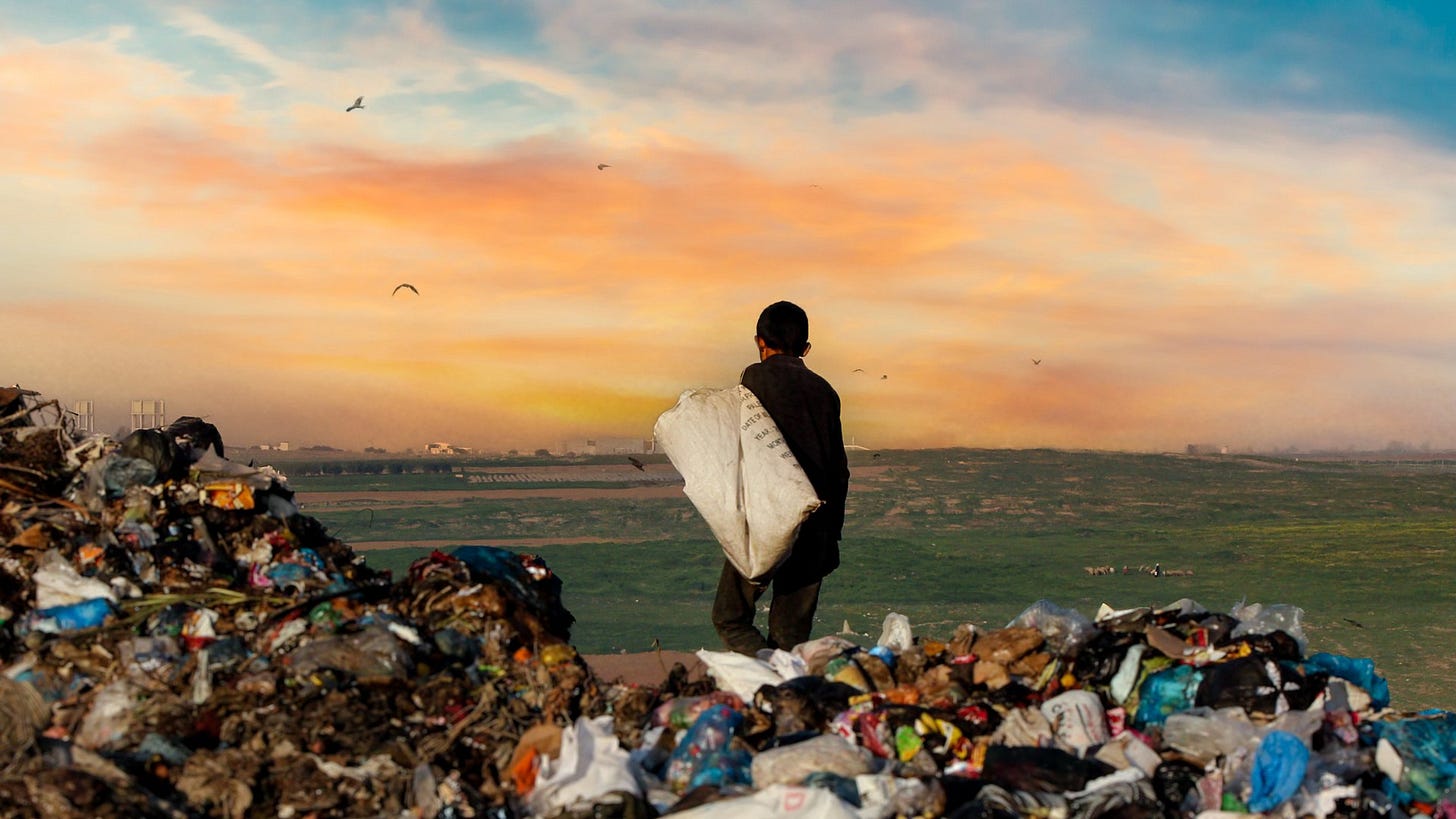Sin is a big deal
The biggest understatement of all time
What if sin is a bigger deal than we usually talk about?
The personal impact of sin is explored in Bible classes, sermons, and articles. Sin leads to a host of personal problems, not the least of which is the guilt, wrath, and condemnation that Jesus saves and heals us from through His atoning sacrifice and resurrection.
We’re also used to hearing about how sin can lead to practical personal issues: “The way of transgressors is hard,”1 clean living has its benefits, etc. But in Scripture, sin is more than a personal indiscretion, it’s a cosmic crime.
In an individualistic culture, we emphasize the personal impact of sin. There’s nothing wrong with talking about sin from a personal perspective—Jesus saves individuals. But He also saves a body, the church.2 There’s a corporate dimension to salvation, and we should expect a corporate dimension to sin.
Sin doesn’t just affect individuals; sin affects the environment and nations.
The ecological impact of sin
Dust is our past and our future. Humans do not exist outside of nature; observing nature indifferently from some disconnected dimension. We are a part of nature. The same God that created us created the natural world around us. Sin isn’t just an affront to God’s will for humans, it’s contra the entire natural order.
In the aftermath of the first sin, only two things are cursed by God: the serpent and the ground.3 In the text, God does not put Adam and Eve under a curse, but He does say, “Cursed is the ground for your sake; in toil you shall eat of it all the days of your life. Both thorns and thistles it shall bring forth for you, and you shall eat the herb of the field.”4 In the very first human disobedience we see the creation-wide impact of sin.
This motif continues throughout the Bible, especially the Old Testament. Israel is admonished in the holiness code of Leviticus to not join in with the sins of the previous inhabitants of Canaan because the “land” was “defiled” by the “abominations” that they committed, and the land “vomited out the nations that were before” Israel.5 The sexual sin and idolatry of the Canaanites didn’t just defile them, it defiled the land, and the land revolted.
Throughout the prophets and the Psalms, God warns His people that their land would turn against them if they continued in unrepentant sin:
“He turns rivers into a desert, springs of water into thirsty ground, a fruitful land into a salty waste, because of the evil of its inhabitants.” (Ps 107:33-34 ESV)
“The earth mourns and withers; the world languishes and withers; the highest people of the earth languish. The earth lies defiled under its inhabitants; for they have transgressed the laws, violated the statutes, broken the everlasting covenant. Therefore a curse devours the earth, and its inhabitants suffer for their guilt; therefore the inhabitants of the earth are scorched, and few men are left.” (Isa 24:4-6 ESV)
“There is no faithfulness or steadfast love, and no knowledge of God in the land; there is swearing, lying, murder, stealing, and committing adultery; they break all bounds, and bloodshed follows bloodshed. Therefore the land mourns, and all who dwell in it languish, and also the beasts of the field and the birds of the heavens, and even the fish of the sea are taken away.“ (Hosea 4:1-3 ESV)
If we really cared about the environment and wanted to be “green,” we’d prioritize personal holiness and repentance over decarbonization.6 The bounties of nature come from the hand of the Lord, not impersonal and morally indifferent natural forces. We can’t hate God and expect to eat from His garden for free forever.
Eventually, the fiery sword blocks the way, the land is defiled, and sinners suffer for their consequences. Such is why the wrath of God destroys “the destroyers of the earth.”7 Sin isn’t just a private matter. Even when done in secret, sin’s consequences are as widespread as soil and sea.
The national impact of sin
Proverbs 14:34’s “Righteousness exalts a nation, but sin is a reproach to any people” is more than a rallying cry in the ongoing culture war. It’s a reminder about the sweeping impact of sin, or righteousness, on nations.
Individuals are the base component of a nation,8 so we should expect that a large number of individuals disregarding and disobeying God would have national consequences.
Despite the WEF’s best efforts, we do not live in a borderless one-world government, nor are nations a bad thing. Nations are instituted by God.9 If the words of Jesus are any indication, nations are to be evangelized as part of the great commission, and nations will appear in judgment.10 While the final judgement is ultimately individual and personal, God raises and humbles nations in time according to their righteousness.
Proverbs 14:34 isn’t for biblical Israel alone. Sin is a reproach to any people. America, China, Uganda, and every nation in between, can be exalted in righteousness or reproached in sin. This isn’t only an Old Testament principle. Jerusalem was destroyed in AD 70 in part because of their rejection of the Messiah and murder of the prophets,11 and the western Roman Empire’s moral decadence led to its trampling by Germanic tribes in the providence of God.
The nations that forget God have only hell to look forward to,12 and it’s a historical certainty that nations that forget God en masse turn into hell on earth. God told Ezekiel, “if a land sins against me by persistent unfaithfulness, I will stretch out my hand against it.”13
Thankfully, God is willing to relent from disaster in the face of repentance. Like Nineveh repenting at the preaching (if you can call it that) of Jonah, and Daniel praying and repenting for his nation while exiled in a foreign land, God’s mercy is available for sinful nations… until it isn’t.
For many nations (especially America, I would argue), the fundamental problem is not political, but spiritual. If this is true, the solution to many national ills is not primarily political, but spiritual. We need nation-wide repentance, prayer, and righteousness. If you want to help your country for years to come, start making disciples like your life depends on it, while doing everything you personally can to live in the fear of the Lord with your family.
Okay, so what?
If sin is a bigger deal than I previously thought, then Jesus is a bigger savior than I previously thought. My observations above aren’t novel, but in my experience they are overlooked. We’ve emphasized Jesus as a “personal savior” to the neglect of the wider-sweeping impact both of sin and Jesus’s atonement. Jesus isn’t just the only hope for individuals, He’s also the only hope for nations and creation as a whole.
Sometimes, as Christians who call out sin, we’ll be asked, “who are you to judge?” God is the ultimate judge, but if we live in the same land/nation, your sin actually is my business (and vice versa).
If sin really only impacted the individual, Christians would still care because we love people and don’t want them to be lost. But sin affects so much more, and therefore Christians need to not be silent.
Keep lovingly pointing people to Jesus. Refuse to compromise on God’s righteousness. Jesus is Lord of heaven and earth. He’s waiting to reconcile all things to Himself through the blood of the cross of Jesus.
Prov 13:15, KJV
Eph 5:23
Thanks to Hiram Kemp for pointing this out to me.
Gen 3:17b-18, NKJV
Lev 18:27-28
But, Fortune 500 companies cannot monetize true repentance, so this is unlikely to happen.
Rev 11:18
Fundamentally, a nation is a collection of families (usually bound together by some shared history, geography, culture, ethnicity, language, etc.). A family is usually a collection of individuals bound together by shared ancestry and mutual responsibility.
“And He has made from one blood every nation of men to dwell on all the face of the earth, and has determined their preappointed times and the boundaries of their dwellings” (Acts 17:26 NKJV; see also Deut 32:8; Job 12:23).
Matt 28:19; 25:31-32; 11:23
Luke 11:49-51; Matt 21:33-46; 1 Thes 2:14-16
Ps 9:17 NKJV
Ezek 14:12





This is great stuff
This is excellent. Another way in which we’ve got to move from the western and individualistic ideas of a topic back to what’s biblical. And this will help with our understanding of NT passages on sin (Romans). I especially appreciate the attention you gave the land, a huge part of OT literature that just gets overlooked today.